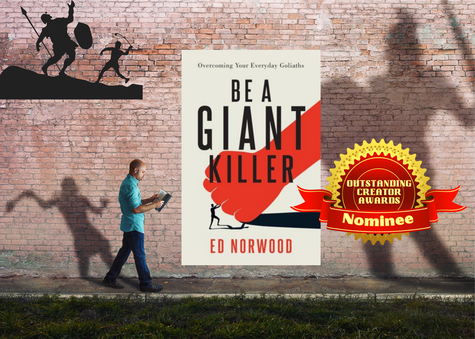|
Score: 94/100 (9.4 out of 10)
“Be a Giant Killer” by Ed Norwood may be the best Christian non-fiction book we've read. If it's not, it's very close! And considering that we've read at least a dozen (likely more) this year, that's saying a lot. Of course there was “Revelation Through Science” by Governor James Martin, PhD last season, but that was heavily focused on chemistry and biology with a hint of philosophy. There wasn't too much actual discussion of Christianity or religion in it per se. On the other hand, we've seen some really out-of-the-ordinary, somewhat bonkers spirituality books, many of which don't offer practical advice, or the ones that offer practical advice lean toward things we're not so sure the Bible actually promotes like wealth & prosperity or faith healing. “Be a Giant Killer” stands apart in that it offers great and positive life advice from a Christian perspective without being over-the-top, ridiculous, or scammy about it. This is actual, practical life advice that you can actually, practically use to be happier, healthier, and closer to God. Heck, it even reminded us to start praying again, and that's saying something. So, what is this book actually about? The book focuses on overcoming the biggest roadblocks to our success and happiness in life—to our self-actualization—or, in this spiritual/religious context, fulfilling God's ultimate purpose for your life. In one sense, this book is thematically and stylistically very similar to “Doubt Your Doubts” by Rachell Kitchen, which we reviewed two seasons ago. While Kitchen had focused on combating and overcoming what she called your “Gremlins” or your “inner Rachel” (a negative alter-ego who stands in your way), Norwood calls these things “Giants” akin to Goliath or the people of Canaan who opposed the Israelites in the Bible. Your “Giants” are things like addiction (to smoking, drinking, drugs, bad foods, idolatry, sex, pornography, etc.) and also things like self-doubt, lack of faith, and procrastination. These “Giants” are the things that, Norwood argues, keep you from realizing your full potential. So how is this book any different from other positive-thinking, positive self-talk, and self-actualization/affirmation books? For one, it's well-written. For another, it's actually pretty interesting to read. And, of course, there's a spiritual or Christian slant to it if you jive with that sort of thing. Even if you're just an agnostic or not necessarily a Christian per se, this could still be a pretty interesting read. For one thing, to be blunt, Ed Norwood isn't massively full of crap. He's not a scammy televangelist trying to get you to mega-tithe your earnings in exchange for a miracle. He's actually very down to earth and very clearly has tremendous ethics and moral standards. Right off the bat, you're treated (or horrified) by the example of Jim Jones and the 1978 Jonestown massacre. The author uses this tragic event in which over 900 people were killed as an example of what happens when you allow evil, toxic people and thoughts to poison your head. These evil, toxic people and thoughts create a cage around you, they encircle and entrap you, they keep you from seeing clearly and realizing that there's a better way: a way out—hope. The devil uses these kinds of people and thoughts to convince us that there's no hope, no way out, no escape, no hope for upward mobility, no point in going on. These things create a “wilderness” for us like the Israelites before they could inherit the Promised Land or Jesus before he could begin his ministry. There's temptation there, and it's our job to find the faith in God and accept the strength and wisdom to resist that temptation. What's very encouraging about this book is that it reminds us that we matter. We are made in the image of God. Our lives have importance and meaning. We have purpose: a purpose to do something special on this earth whether that means running for office, starting a new business, getting married, starting a family, or ministering a church. Norwood reminds us that not all good things come quickly or all at once, often they take time. For example, the Israelites waited a whole generation to inherit the Promised Land, but while they were waiting, they were cultivating that future generation that would eventually take it—the ones who would go on to conquer it in the name of God. God's plan is always in motion and in action, whether we realize it or not, and he is always nudging us forward, we just have to be willing and able to listen. Norwood also ventures into the realm of ethics by reminding us that even though we are entitled to good things as children of God, we have to remain ethical in obtaining them. Achieving things through crime or deception are not the actions of a child of God. For example, when Norwood was nearly broke, $10,000 was accidentally deposited into his bank account. Using this money, which clearly didn't belong to him as it was the result of a mistake, would have been unethical. So, instead of spending this $10,000, he trusted that God had something even bigger and better in store for him than just that money and called the bank to report the mistake. Ultimately, Norwood founded his own organization, the National Council of Reimbursement Advocacy, which has stood since 2000. Norwood has become prosperous, making far, far more than that $10,000 per year. He says that the times being on welfare prepared him for a lifetime of making millions. This book is incredible in that it encourages you to see the bigger picture in the little things. Every time we make a decision God would be proud of, we are coming closer to him and to our purpose in life. Check out this highly-recommended book on Amazon!
0 Comments
Leave a Reply. |
Archives
July 2024
Categories |

 RSS Feed
RSS Feed